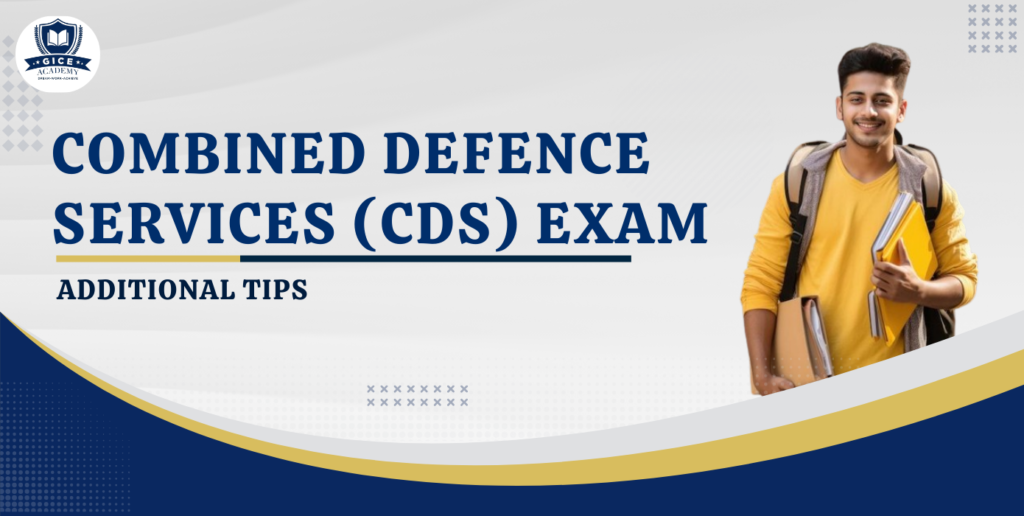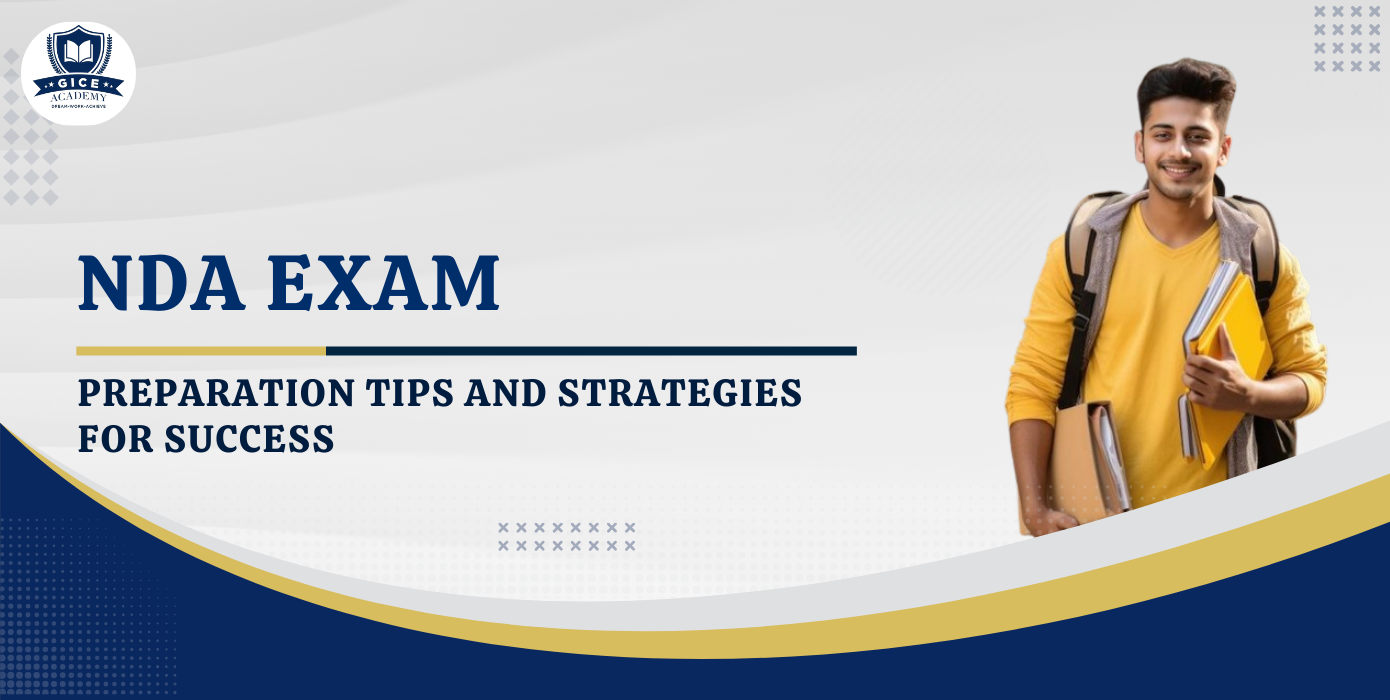Table of Contents
Introduction:
Preparing for the National Defense Academy (NDA) entrance exam requires a focused approach and diligent effort. The NDA exam, conducted by the Combined Defense Services (CDS), serves as a gateway for young aspirants aiming to embark on a career in the Indian armed forces. GICE Academy recognizes the significance of this exam in shaping the future of candidates who aspire to serve their nation with honor and dedication.
This guide aims to provide essential tips and effective strategies to help you navigate through the preparation process and achieve success in the NDA exam. Whether you are aiming for the Army, Navy, or Air Force, these insights will assist you in maximizing your preparation and realizing your dreams of joining the esteemed ranks of the Indian armed forces.
Section 2: Understanding the NDA Exam (Expanded)
Overview of the Exam: The NDA exam, conducted by the Union Public Service Commission (UPSC) twice a year, is a gateway to the Indian Armed Forces, including the Army, Navy, and Air Force. It is highly competitive, attracting thousands of aspirants national defence academy.
Exam Pattern:The NDA exam consists of two papers:
Mathematics: This paper has 300 marks and tests candidates on various mathematical concepts up to the 12th standard level. The questions are objective, requiring a strong foundation in mathematics to score well.
General Ability Test (GAT): This paper has 600 marks and is divided into two sections:
English (200 marks): This section assesses the candidate’s understanding of English, including grammar, vocabulary, and comprehension skills.
General Knowledge (400 marks): This section covers physics, chemistry, general science, history, geography, and current affairs.
Syllabus Breakdown:Mathematics: Key topics include algebra, trigonometry, calculus, analytical geometry, differential equations, vector algebra, statistics, and probability.
General Ability Test (GAT):
English: Focus on grammar, vocabulary, comprehension, and basic language usage.
General Knowledge: Includes subjects like Physics (basic principles, measurements), Chemistry (acids, bases, and elements), General Science (human body, environmental science), History (Indian and world history), Geography (India’s physical and political geography), and Current Affairs.
Section 3: Preparation Tips and Strategies (Expanded) for NDA Exam
- Creating a Study Plan: A well-structured study plan is crucial for NDA exam preparation. It helps in covering the vast NDA syllabus systematically.
- Divide the syllabus: Break down the NDA syllabus into smaller sections and allocate time for each. This ensures that all topics are covered.
- Daily schedule: Allocate specific time slots for each subject daily. For instance, mornings can be dedicated to mathematics, while evenings can be for the GAT.
- Short breaks: Include short breaks between study sessions to avoid burnout and maintain productivity.
- Effective Time Management: Time management is essential for efficient NDA exam preparation. Here’s how you can manage your time effectively:
Prioritize topics:
- Identify your strengths and weaknesses. Focus more on weaker areas while maintaining proficiency in stronger subjects.
- Use a timer. Practice solving questions within a set time to improve speed and accuracy.
Consistency: Maintain a consistent study schedule. Regular study is more effective than last-minute cramming.
Subject-wise Preparation Tips: Mathematics: Conceptual understanding: Focus on understanding the underlying concepts rather than rote learning. This helps in solving a variety of problems.
Regular practice:
- Mathematics requires regular practice. Solve different types of problems to gain confidence.
- Solve previous year question papers to understand the NDA exam pattern and frequently asked questions.
General Ability Test (GAT): English: Read newspapers, practice comprehension passages, and work on vocabulary.
General Knowledge: Stay updated with current affairs, read standard GK books, and use online resources.
Recommended Books and Resources for NDA Exam:
- Mathematics: RS Aggarwal’s Mathematics for NDA.
- English Grammar and Composition: Wren and Martin’s High School English Grammar and Composition.
- General Knowledge: Manorama Yearbook, Lucent’s General Knowledge.
Section 4: Physical Fitness Preparation
Importance of Physical Fitness: Physical fitness is crucial for clearing the NDA physical fitness tests and for your overall training in the academy.
Recommended Exercises and Routine:
- Regular running, push-ups, sit-ups, and pull-ups.
- Swimming and other sports activities to enhance overall fitness.
- Follow a balanced diet to maintain good health.
Section 5: Mock Tests and Practice Papers
Importance of Mock Tests: Mock tests simulate the actual exam environment and help you manage exam stress.
Analyzing Your Performance:
- Review your answers to identify areas of improvement.
- Work on weak areas to enhance your performance.
Section 6: Interview Preparation
Interview Process: The Services Selection Board (SSB) interview is conducted over five days and includes psychological tests, group tasks, and personal interviews.
Tips for Success:
- Be confident and honest in your responses.
- Develop good communication skills.
- Participate actively in group discussions and tasks.
Section 7: Maintaining Motivation and Health
Staying Motivated:
- Set realistic goals and reward yourself on achieving them.
- Join study groups for mutual support.
Managing Stress:
- Practice relaxation techniques like meditation and yoga.
- Ensure adequate sleep and take breaks when needed.
Combined Defence Services (CDS) Exam: Additional Tips
The Combined Defence Services (CDS) exam is another prestigious examination conducted by the Union Public Service Commission (UPSC) for recruitment into the Indian Military Academy, Officers Training Academy, Indian naval academy, and Indian Air Force Academy. Here’s how you can prepare for the CDS exam:

Exam Pattern:The CDS exam pattern includes three papers: English, General Knowledge, and Elementary Mathematics for the Indian Military Academy, , and Air Force Academy. The Officers Training Academy requires candidates to appear for only the English and General Knowledge papers.
Eligibility Criteria:Candidates must meet specific eligibility criteria related to age, educational qualifications, and nationality. Detailed criteria can be found on the official website of the UPSC.
Negative Marking: The CDS exam includes negative marking for incorrect answers. It is essential to be cautious while answering questions to avoid losing marks.
CDS Application Process: Candidates can apply online through the online application portal available on the UPSC official website. Make sure to complete the CDS application form accurately and submit it before the deadline.
CDS Admit Card: The CDS admit card is released a few weeks before the exam. Candidates must download the CDS admit card from the UPSC official website and carry it to the exam center.
Answer Key and Result:The answer key for the CDS exam is released after the exam. Candidates can check their answers and estimate their scores. The CDS result is announced on the UPSC official website. Successful candidates are then called for the SSB interview and lok sabha
By following these tips and strategies for both the NDA and CDS exams, you can enhance your chances of success and embark on a rewarding career in the Indian Armed Forces.
Conclusion
In conclusion, preparing for the NDA exam demands commitment, discipline, and a well-structured approach. By following the tips and strategies outlined in this guide, you can enhance your readiness and confidence to tackle the challenges posed by the exam. Remember, consistent practice, thorough understanding of concepts, and effective time management are key to achieving success in the NDA exam. GICE Academy wishes you the best in your endeavors as you aspire to serve your country with pride and distinction in the Indian armed forces.
Stay tuned for our next blog where we will delve into tips and strategies specifically tailored for the Combined Defense Services (CDS) exam. Whether you are preparing for the Army, Navy, or Air Force through the CDS route, we will provide valuable insights to help you excel in your preparation and achieve your goal of joining the Indian armed forces.
The premier institute for NDA exam preparation with NDA coaching classes in Thane, offering experienced faculty, comprehensive study material, personalized coaching, and proven success to help you excel in your NDA career.
FAQ
What is the eligibility criteria for the NDA exam?
Age: 16.5 to 19.5 years, Education: 10+2 for Army, Physics, and Mathematics for Air Force and Navy, Nationality: Indian citizens.
How important is the Mathematics section in the NDA exam?
It carries 300 marks and is crucial for overall performance.
What are the best books for NDA preparation?
RD Sharma for Mathematics, NCERT textbooks, and standard GK books.
How can I improve my General Knowledge for the NDA exam?
Read newspapers, follow current events, and use GK books.
What is the role of physical fitness in NDA selection?
Essential for the SSB interview and overall selection process.
How should I manage my time while preparing for the NDA exam?
Prioritize topics, maintain a balanced study schedule, and avoid procrastination.
What are some effective revision strategies for the NDA exam?
Solve previous papers, take mock tests, and revise regularly.
How can I stay motivated during my NDA preparation?
Set clear goals, take breaks, and stay positive.
What should I do if I feel stressed before the NDA exam?
Practice deep breathing, stay positive, and avoid last-minute cramming.
How can I improve my English skills for the GAT section?
Read daily, practice grammar exercises, and expand vocabulary.


